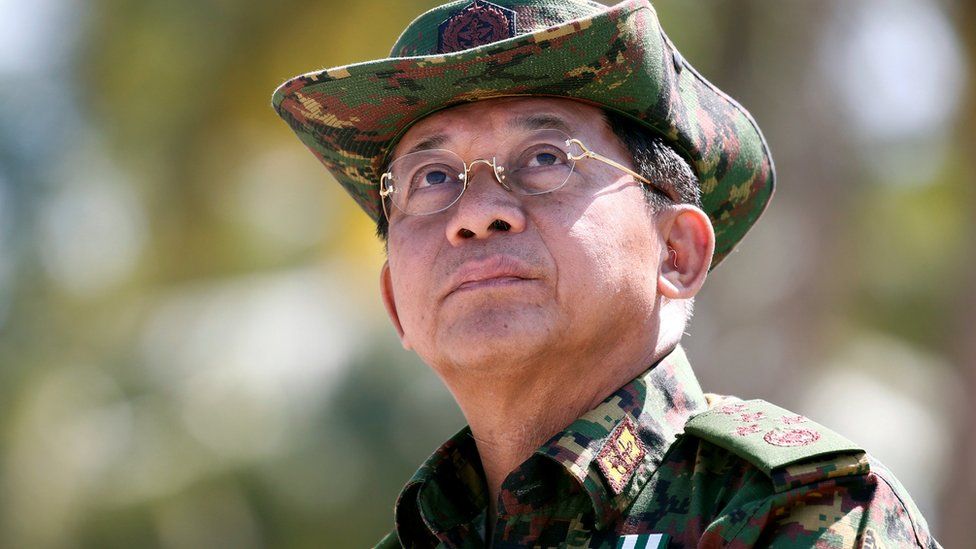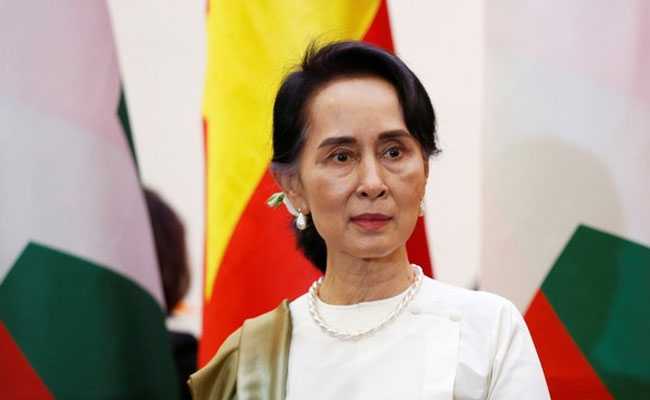Myanmar’s military has taken control of the country after Aung San Suu Kyi and other political leaders were arrested in the early hours.
The coup comes after tensions rose between the civilian government and the military following a disputed election.
Hours after the arrests, military TV confirmed a state of emergency had been declared for one year.
Myanmar, also known as Burma, was ruled by the military until democratic reforms began in 2011.
The military said on Monday it was handing power to commander-in-chief Min Aung Hlaing. Soldiers are on the streets of the capital, Nay Pyi Taw, and the main city, Yangon.
In November’s election, Ms Suu Kyi’s National League for Democracy (NLD) won enough seats to form a government. The army says the vote was fraudulent.
Earlier NLD spokesman Myo Nyunt said Ms Suu Kyi, President Win Myint and other leaders had been “taken” in the early hours of the morning.
“I want to tell our people not to respond rashly and I want them to act according to the law,” he said, adding he also expected to be detained.
Soldiers also visited the homes of chief ministers in several regions and took them away, family members said.
The newly-elected lower house of parliament was due to convene for the first time on Monday but the military was calling for a postponement.
‘A clear violation of the constitution’
The BBC’s South East Asia correspondent, Jonathan Head, says the coup appears to be a clear violation of the constitution drafted by the military more than a decade ago, and which it promised to honour only on Saturday.

Detaining political leaders like Ms Suu Kyi is a provocative and very risky move, one which may well be strongly opposed, our correspondent says.
“The military junta that ruled Myanmar for decades never really stepped away from power in the first place,” John Sifton of Human Rights Watch said.
“They never really submitted to civilian authority in the first place, so today’s events in some sense are merely revealing a political reality that already existed.”
“The doors just opened to a very different future,” Thant Myint-U, Yangon-based historian and author described the outlook. “I have a sinking feeling that no one will really be able to control what comes next.”
“And remember Myanmar’s a country awash in weapons, with deep divisions across ethnic and religious lines, where millions can barely feed themselves.”
What is the situation on the ground?
Mobile internet data connections and some phone services have been disrupted in major cities, while the state broadcaster MRTV says it is having technical issues and is off air.
Communications with Nay Pyi Taw are down and it is difficult to assess the situation there.
There are reports that people in Yangon are rushing to get money from ATMs amid expectations of a cash crunch in the coming days.
What happened in the election?
The NLD won 83% of available seats in the 8 November election in what many saw as a referendum on Ms Suu Kyi’s civilian government.
It was just the second election since the end of military rule in 2011.
But the military has disputed the result, filing complaints at the Supreme Court against the president and the chair of the electoral commission.
Fears of a coup rose after the military recently threatened to “take action” over alleged fraud. The election commission has rejected the allegations.
Who is Aung San Suu Kyi?
Aung San Suu Kyi is the daughter of Myanmar’s independence hero, General Aung San. He was assassinated when she was only two years old, just before Myanmar gained independence from British colonial rule in 1948.
Ms Suu Kyi was once seen as a beacon for human rights – a principled activist who gave up her freedom to challenge the ruthless army generals who ruled Myanmar for decades.
Ms Suu Kyi spent nearly 15 years in detention between 1989 and 2010.
In November 2015 she led the National League for Democracy (NLD) to a landslide victory in Myanmar’s first openly contested election for 25 years.
The Myanmar constitution forbids her from becoming president because she has children who are foreign nationals. But Ms Suu Kyi, now 75, is widely seen as de facto leader.
But since becoming Myanmar’s state counsellor, her leadership has been defined by the treatment of the country’s mostly Muslim Rohingya minority.
In 2017 hundreds of thousands of Rohingya fled to neighbouring Bangladesh due to an army crackdown sparked by deadly attacks on police stations in Rakhine state.
Ms Suu Kyi’s former international supporters accused her of doing nothing to stop rape, murder and possible genocide by refusing to condemn the still powerful military or acknowledge accounts of atrocities.
A few initially argued that she was a pragmatic politician, trying to govern a multi-ethnic country with a complex history.
But her personal defence of the army’s actions at the International Court of Justice hearing in 2019 in the Hague was seen as a new turning point that obliterated what little remained of her international reputation.
At home, however, “the Lady”, as Ms Suu Kyi is known, remains wildly popular among the Buddhist majority who hold little sympathy for the Rohingya.
bbc




